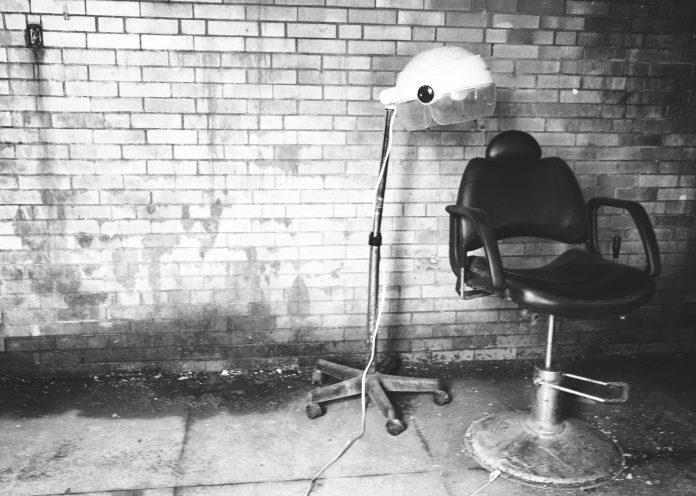By Georgia Kolias
There are places that hold silences. Even within congested and vibrant streets you can find inhalations that are held in like secrets. I had my own secrets that I held within my ribs, caged and fluttering. At 16, I knew my traditional Greek immigrant family would never accept my desire for women, so I started my secret keeping. I thought I was the only one holding secrets, but I eventually learned that my father and I walked the same sidewalks, living hidden lives.
***
Daddy’s barbershop was in the heart of the Mission district in San Francisco, on Mission Street at 24th, right across the street from La Taqueria and Dianda’s pastries. If you don’t know, it is impossible to go to either of these establishments and not leave satisfied, licking your fingers, and too full. The succulent grilled meat wrapped in a warm corn tortilla and topped with huge chunks of avocado and fresh salsa would drip down my arms as I took hungry bites. At Dianda’s we would greedily point at the pastries through the glass case and salivate. Napoleons creamy and crisp, puff pastry filled with a coffee filling and drizzled with crispy caramel, chocolate éclairs forced full of satiny custard. Even now, I am fanaticizing about a gluttonous suitcase of pastries and an eagerness to experience a stomach full to bursting.
Visiting Daddy’s barbershop was rare when I was a kid; it meant a couple of bus lines and my mother’s willingness to be in his company. He charged $8 a haircut and that seemed like a lot of money to me back then. His shop always smelled like the barber antiseptic that he used to soak his combs, and meaty sweat. There was a poster that displayed a variety of proper haircuts that my father could execute, not like the hack jobs that Super Cuts provided. Daddy had pride of craft, and resented being put in the same professional class with Super Cuts.
His landlord owned a bakery, and once a month when the rent was due, Daddy would come home with an apple pie in a white cardboard box. We would jump around, mouths watering – except my mother, who preferred lemon meringue. Mommy sometimes got a turkey or pumpkin pie from her job waitressing at Zim’s, but that was only on Thanksgiving. One night Daddy came home with the white box and an angry scowl. Instead of hopping around, we took the cue to step back to see what would unleash. Mommy took the pie and put it on the counter, then followed Daddy into the bedroom, where the yelling started.
I could hear him screaming, “Super Cuts!” and “Bastardes!” which is some kind of Greeklish swear word he liked to use, like “God dammiteh!” Greek words tend to gather syllables like clusters of grapes, our nimble tongues crushing them with ease. I suppose adding that last syllable made it feel more like home. Short words are too easy. Short words like Super Cuts. America first took away our multisyllabic opportunities when she shortened our surname from Kotsokolias to Kolias. Even now, I envy the names of friends that proudly survived the shearing, Papafrangrou, Kostoulas, Pouzoukidis, Liakopoulos.
The landlord had delivered bad news along with the apple pie this time. Daddy had to move. He had to leave his barbershop and make way for someone else. His revolving red, white, and blue barber pole would come to a halt to make room for a new tenant, a new game. The fact that it was a Super Cuts only added salt to the wound. I could hear him screaming “Super Cuts! They don’t know how to cut hair, they just want money. They take five minutes! God dammiteh!” His voice thundered through our flat. My sister slunk into our bedroom and hid under her covers. I crept up toward the room where my parents stood. My mother in her long velour yellow house robe and brown slippers, standing with her hands clenched around a dishtowel, took small steps backward as my father raged.
***
He did find a new barbershop on Valencia Street, across the street from Kentucky Fried Chicken and Lucca Delicatessen, and years later down the block from the feminist (read lesbian) bookstore, Old Wives Tales. Old Wives Tales was a place where a young baby dyke like me could go and find some peace and words and escape and honesty. I tried to be careful not to walk past my father’s barbershop with my girlfriends, but he did spot me once with one short-haired, brunette personal trainer who’d picked me up at the gym. He later stole her love letters to me as proof of my moral corruptibility.
The barbershop smelled of Kentucky Fried Chicken. Finger licking good. One day a woman walked in and asked my father to shave her legs with a straight edge razor. He agreed to do it, stroking his straight edge back and forth on the sharpening belt before crouching down before her legs resting on the red vinyl barber chair. When the barber chair upholstery wore out he would patch it with matching vinyl. I imagined her resting her arms on the scrolled silver and red vinyl arm rests, her head of long hair thrown back, lips parted, as my father pressed his straight edge to her vulnerable calves.
When my father shared the story of his provocative new customer that night my mother asked, “What kind of woman goes to the barbershop to get her legs shaved?” My mother had a fierce look in her eyes, her voice edging on sarcasm and rusty metal. “Was she a prostitute?” My father laughed it off, his jolly smile emerging. He was a jokester who could recite memorized poems from the homeland till his power of speech left him. Rhyming poems, limericks, sayings in Greek that I could only partially understand, even with an explanation. “Was she really a prostitute?” I asked my mother. “Go clean the dishes,” she replied.
***
My phone rang at some dark hour—was it 5 a.m.?—and I answered it quickly. I had a guest in my bed. I was a full-grown woman in my twenties with my own apartment. A voice—my sister’s?—said, “Daddy is in the hospital. He had a stroke.” I left the girl with the long dark curls in my bed and drove to San Francisco where he lay in his hospital bed. His mouth drooped to the side, no longer able to speak, to yell, to swear in Greeklish, to curse Super Cuts, to tell us we were worthless.
The doctor said he wouldn’t be able to work or drive anymore, and he would have to relearn to talk, to walk. Daddy learned how to cry. He cried when he couldn’t take out his own straight edge razor to shave his stubble clean. He cried when we couldn’t understand what he was saying. He cried when he thought of losing his barbershop.
People we never saw before came to visit at the hospital, apparently friends from the neighborhood, customers, his buddies. They all talked about how he was so sweet, so friendly, so nice. They were going to miss him.
My father was an American. He was born in Greece, but escaped war and poverty into the safe embrace of America, and vowed never to return. He loved his books, marking pages with ideas to return to, learning to repair TVs, make cheese, studying history. When my father refused to select something from the hospital book cart, the orderly assumed he couldn’t read English. When my father expressed his despair over losing his barbershop, the doctor suggested, “Why don’t you go back home, where you came from?” I could see him seething inside of his immobile body, the word “Bastardes!” racing through his injured brain.
When my mother went to clear out his barbershop she found some bras, pictures of Daddy visiting San Francisco attractions with a woman and her family and friends, a softball-sized sphere of hair suspended from the dark rafters of the storeroom, escort business cards with phrases written in his handwriting in English and Spanish: “Do you want to fuck?” “Do you want to go in my car?” She found receipts from money orders made out to a virtual stranger, a little girl living in Greece, a relative’s neighbor, $1000 at a time, while he refused to pay my college tuition.
His neighbors were going to miss him. The little girl was going to miss him. His mistress was going to miss him. Right before his stroke he’d told my mother he’d been planning his escape. He was going to leave my mother, and us, and start a new life, maybe a happy life. And then everything changed. He had a stroke, and then he learned how to cry. And I let go of my secrets. I let them scatter all over the streets of the Mission district in San Francisco. I no longer had anything to hide.


Get ready to connect to your joy, manifest the life of your dreams, and tell the truth about who you are. This program is an excavation of the self, a deep and fun journey into questions such as: If I wasn’t afraid, what would I do? Who would I be if no one told me who I was?
Jennifer Pastiloff, creator of Manifestation Yoga and author of the forthcoming Girl Power: You Are Enough, invites you beyond your comfort zone to explore what it means to be creative, human, and free—through writing, asana, and maybe a dance party or two! Jennifer’s focus is less on yoga postures and more on diving into life in all its unpredictable, messy beauty.
Note Bring a journal, an open heart, and a sense of humor. Click the photo to sign up.


Wow, wow, wow. Thank you for sharing.
[…] This essay can also be read on The Manifest-Station. […]